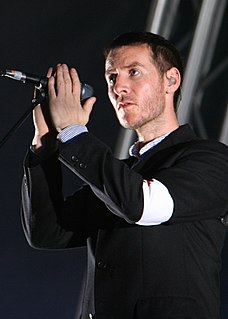A Quote by George Osborne
Britain helped create the Internet - Tim Berners Lee created the World Wide Web, one of a long line of British scientists who have given us an outsized role in shaping our own digital future.
Related Quotes
I'm not a politician, and I do not think I am as effective in this way as people who actually prepare for it - is to focus on technical reform, because I speak the language of technology. I spoke with Tim Berners-Lee, the guy who invented the World Wide Web. We agree on the necessity for this generation to create what he calls the Magna Carta for the Internet. We want to say what "digital rights" should be. What values should we be protecting, and how do we assert them.
Tim Berners-Lee, the 44-year-old English physicist who created the World Wide Web, is precisely the kind of hero that a relatively simple invention with profound social and economic consequences should lay claim to. He is not just creative but democratic, diplomatic, polite and generous with credit and praise.
What I saw quite clearly in the '80s, before the internet, was that the whole world was shifting toward digital formats, and that didn't matter whether it's movies or writing or whatever. It was something that was coming. And with the invention of the World Wide Web in the early '90s, when we were teaching our first courses, or the arrival of the internet by way of the browser, which opened up the internet to everybody - soon it was just revolutionary.
I think there certainly was a milestone in the '90s with regards to the Internet achieving critical mass. There were several magical factors that came together: the creation of HTML by Tim Berners-Lee, the drop in the price of communications, and all the PCs out there that you could put this software into.
When I was 14, I spent a huge amount of time on the Internet, but not the Internet we know today. It was 1994, so while the World Wide Web existed, it wasn't generally accessible. Prodigy and CompuServe were popular, and AOL was on the rise, but I didn't have access to the web, and no one I knew had access to the web.
In every part of the world with which I am familiar, young people are completely immersed in the digital world - so much so, that it is inconceivable to them that they can, for long, be separated from their devices. Indeed, many of us who are not young, who are 'digital immigrants' rather than 'digital natives,' are also wedded to, if not dependent on, our digital devices.






























